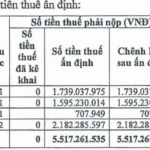Proposal to waive formal penalties during the initial phase
This is one of the proposals submitted by the Vietnam Chamber of Commerce and Industry (VCCI) to the Ministry of Finance, providing feedback on the draft Decree amending and supplementing Decree No. 125/2020/ND-CP on administrative sanctions for violations in the field of taxation and invoices.
According to Decree 70, from June 1st, households and individuals with an annual revenue of VND 1 billion and above must use e-invoices from cash registers connected to the tax authority.
A VCCI survey of 1,368 business households in June showed that most were unaware of the new regulation. Specifically, 68% had only a basic understanding or did not know what to do, and 21% did not understand the content of the regulation. In terms of implementation, 73% reported difficulties due to a lack of technological skills, and 49% said it was challenging to change old management habits.

From June 1st, households and individuals with an annual revenue of VND 1 billion and above must use e-invoices from cash registers connected to the tax authority.
“The challenges, along with limited resources, mean that business households are likely to violate some invoice regulations, especially formal errors such as incorrect entries or untimely issuance of invoices…
These are unintentional mistakes as the households are unfamiliar with the new process and technology and are not willfully non-compliant or evading taxes. Therefore, the law should incorporate humane and reasonable penalty policies to encourage business households to confidently adhere to the new regulations while also fostering long-term revenue sources for the state budget,” VCCI stated.
Representatives of the business community proposed that the drafting agency add a provision to waive administrative sanctions for business households that violate formal requirements during an initial period, possibly for two years. The households would be responsible for rectifying the violations and paying any outstanding taxes arising from these violations.
Another issue raised by the business community is the calculation of “one violation on the same day” as a basis for sanctions. According to the draft, if multiple violations are detected on the same day, only one violation will be sanctioned, with aggravating circumstances considered. However, the concept of “the same day” is unclear.
VCCI pointed out that if an inspection lasting 45 days uncovers several incorrect invoices per day, would this be considered “the same day”? To avoid ambiguity and excessive penalties, VCCI recommended changing it to “during an inspection or tax audit.”
Furthermore, the current regulation only allows for the consolidation of violations if they are of the “same nature.” In reality, multiple invoice items can be incorrect simultaneously, such as the date of issuance, content, and tax code. Especially for new businesses or small enterprises, it is easy to make technical mistakes due to inexperience. Therefore, VCCI suggested expanding the scope of consolidated violations, as long as there is no element of fraud, to reduce unnecessary sanction pressure.
Recommendation for caution or minimal fines
VCCI also recommended caution or the lowest possible fine for the act of issuing invoices at the wrong time, provided it does not affect tax obligations.
This is because the issuance of e-invoices depends on the operation of the technological system. In many cases, this system may stop working or encounter errors due to objective reasons such as software glitches or cyber-attacks. These situations can lead to untimely issuance of invoices, but in essence, the business’s tax obligations and the state budget are not affected.
Additionally, according to business reflections, many units only summarize information from taxpayers but can still be penalized if the information is inaccurate. VCCI suggested that the draft clearly define the responsibilities of each party to avoid penalizing the wrong entities.
Unregistered Securities Trading Lands Cong Thanh Cement in Hot Water.
“The Cement Company, Xi Mang Cong Thanh, has been fined a total of VND 507.5 million by the State Securities Commission of Vietnam (UBCKNN) for failing to disclose information and violating securities trading laws. This penalty serves as a reminder to all listed companies of the importance of adhering to disclosure and transparency regulations.”




















